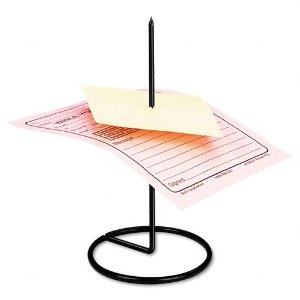“Do you have the patience to wait
Until your mud settles and the water is clear?”

Back in the day, in my first corporate incarnation, I was fresh out of school, and working at our family owned company.
One day I was walking by my uncle’s desk – the very uncle I’ve already posted about – the one who later opened my eyes, and my heart, to the perspectives of the thousands of people who worked for us.
Check it out: https://becomewhoyouare.us/the-picture-from-lifes-other-side/
Anyway, this incident occurred earlier: I was passing by, and I saw him skewering a letter onto this spiky instrument. There were several other documents on it.
I said: “What’s with the spike?” He said “That’s my ‘I don’t know what to do with it’ spike. When I get something that I don’t know what to do about, I stick it on the spike. I check the spike every now and then, and, lo and behold, I find that most of the problems have resolved by themselves.”
I remember rolling my eyes (yeah, I know, but I was still only 21 or 22, and I still knew everything). So, I say to myself “What an idiot. I bet they don’t teach “spikes” in business school. What am I doing in this nut house?”
How could I possibly have known that I was getting my first lecture in Taoism 101, and the Buddhist teaching of “right action?” Most certainly – not from my uncle, who I believe never finished high school (I may be wrong about that), wouldn’t have had the faintest clue, or even given a hoot, about who Lao Tzu was, or that he himself was unknowingly engaging in the practice of a central Taoist tenet– that of “wei wu wei”, literally “doing not doing.”
BTW, If ever I am asked the familiar question as to which book I would bring to be forever stranded on that fabled desert island with, my response would be Lao Tzu’s “Tao Te Ching” – a book of miraculous, yet down to earth wisdom. His teachings are blessings.
By excerpting some passages, from Stephen Mitchell’s amazing translation of the Tao Te Ching, I’ll let him explain the concept of “wei wu wei” to you.
“Can you deal with the most vital matters
by letting events take their course?”
…Can you remain unmoving
Until the right action arises by itself?”
…“Rushing into action, you fail,
Trying to grasp things, you lose them,
Forcing a project to completion,
You ruin what was almost ripe.”
When I find my self jumping to “do” or “fix” something, sometimes even before I understand what’s really going on, I’m (sometimes) able to save myself by bringing to mind one of these. But maybe one of these days, I’m gonna get myself one of those spikes too.
![]() Practice Tip: Today’s practice tip springs from a story I’d like to share. It’s sweet, on point, and if you remember it, it might help you to think about whether you really want to act before you actually do.
Practice Tip: Today’s practice tip springs from a story I’d like to share. It’s sweet, on point, and if you remember it, it might help you to think about whether you really want to act before you actually do.
I heard it from Jack Kornfield, a beautiful storyteller, teacher and human being, at Spirit Rock Meditation Center not far from here:
In ancient China, there’s this dude who owns a teahouse/inn, and business is awful. He is at his wits end, so he goes to see the local Buddhist “ wise master” about what to do. By now, you see that this story can be anywhere, any time, and the “master” can be the “rabbi”, or “whoever”.
So he says: “I’m ruined. I’m not making it. No one is stopping at my inn for tea, or rooms. Please, can you help me?”
The master answers: “I can help you. I have the solution. Go back, and re-name your inn. Call it “The Seven Bells Inn.” Then, I want you to paint a new sign with the words “The Seven Bells Inn.” But, on the sign, I want you to paint EIGHT bells. This is very important.”
The innkeeper said: “But Master, that’s crazy, I don’t understand…”
The Master said: “Please, just trust me, and do it. OK?”
So he did. He went back and did what the Master suggested.
Pretty soon after, he had visitor, who stopped in and said: “You know, I was walking by your inn and I saw your sign, and you know, it’s wrong. The words say seven bells, but there are eight. You made a mistake.”
The innkeeper replied: “Oh really? Thank you so much for stopping to tell me.”
The traveler rejoins: “ Yes, you are welcome. Say, I’m a bit thirsty, so once I’m here, can I have some tea, and BTW, it’s getting pretty late, do you have a bed for me?”
Then, there was another…and another…and…pretty soon… business was booming.
Booming, because most of us have this urge, to intervene, to fix what may (or may not) be broken.
And also, on the bright side, and in fairness to our innkeeper’s new guests, we also have the urge to offer our help to someone who we think needs it.
So, just like right speech, right action is grounded, above all, in our intention. We first have to be crystal clear on our intention before we act. Then, we need to ask:
-Is it true (skillful)?
-Is it necessary?
-Is it kind? (it can even be hurtful, if absolutely essential, but never harmful)
-Is it timely?
Only then, need we act.
Dear reader, I pray that all your actions will be skillful, and please, be kind to yourself,
Metta,
Michael